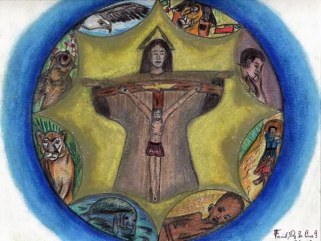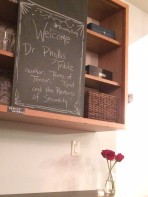 The writings of Julian of Norwich (c.1342– c.1416) have nourished my spiritual imagination since I first encountered them. Perhaps the best known of her words are from Showings, a series of visions that she received in the midst of a near-death experience.
The writings of Julian of Norwich (c.1342– c.1416) have nourished my spiritual imagination since I first encountered them. Perhaps the best known of her words are from Showings, a series of visions that she received in the midst of a near-death experience.
“…but all shall be well, and all shall be well, and all manner of thing shall be well.’
Like many mystics, Julian’s experiences led her to name God in new and surprising ways. Months ago, I came across these striking passages from her Revelations of Divine Love and found them both challenging and insightful.
“The Second Person of the Trinity is our mother in nature, in our substantial making. In him we are grounded and rooted, and he is our mother by mercy in our sensuality, by taking flesh.”
“Thus our mother, Christ, in whom our parts are kept unseparated, works in us in various ways. For in our mother, Christ, we profit and increase, and in mercy he reforms and restores us, and by virtue of his passion, death, and resurrection joins us to our substance.
“To motherhood as properties belong natural love, wisdom and knowledge – and this is God. For though it is true that our bodily bringing forth is very little, low, and simple compared to our spiritual bringing forth, yet it is he who does the mothering in the creatures by whom it is done.”
…. A mother can give her child milk to suck, but our precious mother, Jesus, can feed us with himself. He does so most courteously and most tenderly, with the Blessed Sacrament, which is the precious food of true life. With all the sweet sacraments he sustains us most mercifully and graciously.”
– Revelations of Divine Love of Juliana of Norwich, trans. M.L. Del Mastro

Farid De La Ossa Arrieta: God, the Mother (2002)
Julian invites us to an understanding of God’s essence and nature (revealed in sacred text and in creation) that is broader than the masculine archetypes and language that theologians have defaulted to. I hear it as prophetic language, a kind of poetic truth-telling that challenges the hetero-patriarchy and misogyny that infected the 14th century church and still infects faith communities today.
She also opens a new window through which to view the person of Christ, avoiding well-worn language of control, retribution and power over and against others. But Julian’s Savior sustains, reforms and restores us; Mother Christ invites us to take in goodness from below, to be rooted and grounded in nurturing love. These words invite integration of body, mind and spirit; they affirm our bodies and the way God meets us through our senses; and in naming God as mother she honors womens’ bodies and experiences. What a gift to the church, especially as we imagine new ways to speak of and speak to Divine.
********
It often takes time for me to write new music. A text or experience provides a creative spark but the germination process may take months. On Sunday, while listening to a sermon preached by Julia Stroud at St. Lydia’s (which reflected on the wound on Christ’s body as a space of radical welcome and inclusion), a short song started to flower. By the time we began prayer, the piece was ready to be shared.
We sang it a cappella but the score has a simple piano/guitar accompaniment. You’re welcome to use it as an invitation to prayer (as we did at St. Lydia’s), as a response to prayer petitions, or in another moment where we acknowledge that Christ knows us, loves us, and hears us.
The phrase ‘Mothering Christ’ comes from Jean Janzen’s hymn, “Mothering God, You Gave Me Birth,” which distills Julian’s writings into a beautiful Trinitarian hymn. My setting is much simpler.
Mothering Christ, you know us.
Mothering Christ, you love us.
Mothering Christ, you hear us.
********
If you’re interested in other settings of Julian of Norwich’s words, here are some favorites.
Mothering God, You Gave Me Birth – arr. Tom Trenney (A setting of Jean Janzen’s text for SATB choir and piano, published by Augsburg Fortress)
As Surely As God Is Our Father – William Mathias (for SATB choir and organ, published by Oxford University Press)
Love Unfolding – Gwyneth Walker (for SATB choir and organ, published by E.C. Schirmer)
All Shall Be Well – Emily Scott (a paperless setting that can be taught to congregations)
All Shall Be Well – William Bradley Roberts (a paperless setting from Music By Heart)




